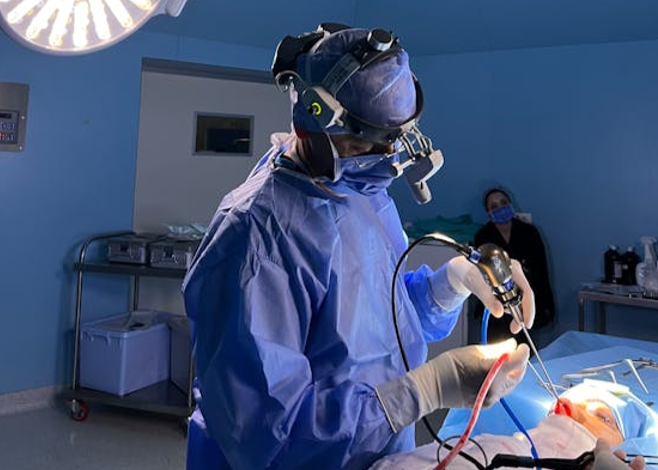Focused Treatment: Specialized Medical and Surgical Interventions

Modern healthcare has evolved tremendously, offering patients access to highly specialised medical and surgical treatments that have the power to address complex health conditions. These advanced interventions require dedicated expertise, cutting-edge technology, and comprehensive care teams working together to achieve optimal outcomes. Today’s medical facilities provide targeted solutions for conditions that once seemed insurmountable, transforming patient recovery experiences.
Contemporary healthcare facilities, such as a reputable hospital in Ranchi, recognise that complex medical conditions demand specialised attention and advanced treatment protocols. These institutions invest heavily in state-of-the-art equipment, skilled specialists, and comprehensive care programmes designed to address specific patient needs. The focus on specialised care ensures that patients receive precisely the treatment their condition requires, rather than generic approaches.
Advanced Surgical Procedures
Minimally Invasive Techniques: Modern surgical approaches prioritise patient comfort and faster recovery times through advanced minimally invasive procedures. These techniques utilise smaller incisions, specialised instruments, and sophisticated imaging technology to perform complex operations with reduced trauma to surrounding tissues. Patients typically experience less pain, shorter hospital stays, and quicker return to normal activities compared to traditional open surgery methods.
Robotic-Assisted Surgery: Precision surgical interventions now incorporate robotic technology that allows surgeons to perform intricate procedures with enhanced accuracy and control. The robotic systems provide magnified three-dimensional views of the surgical site, enabling surgeons to navigate complex anatomical structures with unprecedented precision. This technology particularly benefits patients requiring delicate procedures involving vital organs or intricate tissue repair.
Laparoscopic Procedures: Keyhole surgery techniques have revolutionised various medical specialties, allowing surgeons to perform complex operations through small incisions using specialised cameras and instruments. These procedures significantly reduce recovery time, minimise scarring, and lower the risk of post-operative complications. Patients benefit from reduced pain levels and faster rehabilitation compared to conventional surgical approaches.
Specialised Dialysis Services
Haemodialysis Treatment: Patients with kidney failure require regular dialysis treatment to maintain proper blood chemistry and fluid balance. Modern dialysis units provide comfortable, well-equipped treatment environments where patients receive personalised care during their sessions. The treatment process removes waste products and excess fluid from the blood when the kidneys cannot perform these functions naturally.
Peritoneal Dialysis Options: Alternative dialysis methods offer patients flexibility in managing their kidney failure treatment. Peritoneal dialysis allows patients to perform treatment at home using the peritoneum as a natural filter. This approach provides greater independence and can be particularly beneficial for patients who prefer to maintain their daily routines whilst receiving necessary treatment.
The following key benefits characterise effective dialysis programmes:
- Personalised treatment schedules adapted to individual patient needs and lifestyle requirements
- Comprehensive monitoring systems that track patient progress and adjust treatment protocols accordingly
- Nutritional counselling and dietary guidance to support overall health during treatment
- Emotional support services to help patients cope with the psychological aspects of chronic kidney disease
- Family education programmes to ensure proper understanding of treatment requirements and home care needs
Targeted Physiotherapy and Rehabilitation
Post-Surgical Recovery: Rehabilitation services play a crucial role in helping patients regain strength, mobility, and function following surgical procedures. Specialised physiotherapists design customised exercise programmes that address specific post-operative needs, ensuring patients achieve optimal recovery outcomes. These programmes typically include progressive strengthening exercises, range-of-motion activities, and functional training tailored to individual patient goals.
Neurological Rehabilitation: Patients recovering from strokes, spinal cord injuries, or other neurological conditions benefit from specialised rehabilitation programmes that focus on retraining the nervous system. These comprehensive programmes incorporate various therapeutic approaches, including occupational therapy, speech therapy, and physical rehabilitation. The goal is to help patients regain as much independence as possible and improve their quality of life.
Orthopaedic Recovery: Musculoskeletal injuries and conditions require targeted rehabilitation approaches that address specific biomechanical issues and functional limitations. Specialised orthopaedic physiotherapy programmes help patients restore normal movement patterns, reduce pain, and prevent future injuries. These programmes often incorporate manual therapy techniques, exercise prescription, and patient education about injury prevention strategies.
Multidisciplinary Care Teams
Specialist Coordination: Effective specialised treatment requires seamless collaboration between various medical specialists, each contributing their expertise to patient care. These multidisciplinary teams typically include surgeons, physicians, nurses, therapists, and support staff who work together to develop comprehensive treatment plans. Regular team meetings ensure that all aspects of patient care are addressed and that treatment approaches remain coordinated throughout the recovery process.
Nursing Excellence: Specialised nursing care forms the backbone of successful treatment programmes, with nurses providing continuous monitoring, medication management, and patient education. These skilled professionals possess advanced training in specific medical areas, enabling them to recognise subtle changes in patient conditions and respond appropriately. Their expertise contributes significantly to positive patient outcomes and smooth recovery processes.
State-of-the-Art Infrastructure
Advanced Medical Equipment: Modern medical facilities invest in cutting-edge technology that supports accurate diagnosis and effective treatment delivery. This equipment includes sophisticated imaging systems, surgical instruments, monitoring devices, and therapeutic machinery that enable healthcare providers to deliver precise, effective care. Regular equipment updates ensure that patients receive treatment using the most current technology available.
Specialised Treatment Environments: Different medical conditions require specific environmental considerations to optimise treatment outcomes. Modern facilities design treatment areas that address these needs, including sterile surgical suites, comfortable dialysis units, and well-equipped rehabilitation gyms. These environments support both patient comfort and clinical effectiveness during treatment delivery.
Conclusion
Specialised medical and surgical interventions represent the pinnacle of modern healthcare delivery, offering patients access to targeted treatments that address complex health conditions with precision and effectiveness. The combination of advanced technology, skilled specialists, and comprehensive care teams ensures that patients receive optimal treatment for their specific needs. If you’re facing a complex medical condition, seek consultation with qualified specialists who can evaluate your situation and recommend appropriate treatment options tailored to your individual circumstances.






